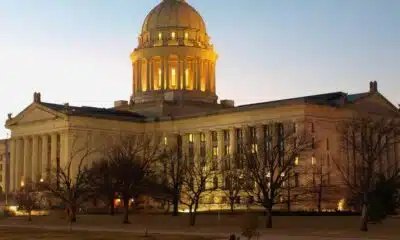News from the South - Alabama News Feed
Student loan caps might worsen the national doctor shortage, critics worry
by Shalina Chatlani, Alabama Reflector
July 26, 2025
This story originally appeared on Stateline.
Twenty-eight-year-old Michaela Bonner has been working 12-hour shifts as an emergency medical technician in Norfolk, Virginia, for the past four years, while attending and paying for college to finish her prerequisites for medical school.
But now that President Donald Trump’s signature tax and spending law bars students from borrowing more than $50,000 annually in unsubsidized federal loans for medical school, Bonner is worried her dream of becoming a doctor is financially out of reach.
“I get told, ‘Well, we really need you. We have a physician shortage, and you’ve done all this work leading up to this point,’ and that’s true as well, and it’s not that I want to quit,” Bonner said in a recent interview. “But there are no systems in place that I can rely on to support me now that I can’t take out the full cost of living through loans.”
GET THE MORNING HEADLINES.
The tax and spending law includes provisions that significantly alter the student loan process for higher education. The law halts current student loan repayment plans for loans that are granted on or after July 1, 2026. On that date, the law also terminates Grad PLUS loans, which have helped people pay for their higher education degrees and total cost of attendance. Current borrowers will be grandfathered in.
The federal law gives current borrowers enrolled in loan repayment plans for students based on income — such as those plans known as SAVE or IBR — until July 1, 2028, to switch to a new plan. Interest collection will resume Aug. 1 for students enrolled in the Biden-era SAVE plan.
At the same time, medical or law school students hoping to get unsubsidized federal loans — in which the borrower is responsible for paying the interest at all times rather than the government — will only be able to borrow $50,000 per year, with a $200,000 lifetime cap. Those seeking advanced degrees in areas such as history or philosophy have a $100,000 lifetime cap.
There are no systems in place that I can rely on to support me now that I can’t take out the full cost of living through loans.
– Michaela Bonner, aspiring medical student
The average yearly cost of medical school for the 2024-25 academic year ranged from around $42,000 to $72,000, depending on whether the school was private or public and whether the student was a resident or nonresident, according to the Association of American Medical Colleges.
Some congressional Republicans say that students need to be working harder to pay for higher education, like medical school, on their own. Others say the caps put the onus back on colleges and universities to rein in the rising cost of tuition. But critics of this legislation say the loan caps are only going to harm students, especially from lower-income backgrounds, and will exacerbate physician shortages.
In recent years states have tried to ease physician shortages by implementing various policy solutions. Since 2023, at least nine states have made it easier for doctors trained in other countries to get medical licenses. States have also participated in interstate licensing compacts, allowing nurses and physician assistants to travel across state lines to work, so long as they are licensed in one state within the compact.
For student loan relief, more than 20 states have enacted legislation to address student loan forgiveness, according to the National Conference of State Legislatures, a group that tracks states policies. Georgia passed a measure that will expand a cancelable loan program for physicians working in rural and underserved areas. Idaho also created the Rural Nursing Loan Repayment Program, offering nurses $25,000 in forgivable loans after three years of service in a rural area.
McKenzie Richards, a health care policy fellow at the conservative think tank Cicero Institute who has been studying the pace of physician shortages, told Stateline that the national physician shortage could potentially exceed 100,000 by 2034. At the end of 2024 that projected number was closer to 64,000 physicians.
Richards said states will be looking toward more policy solutions should the student loan changes exacerbate physician shortages.
“We know what’s going to be happening coming down the line in just five years, so I think policies that states can adopt to get out of this are really important to be looking at now,” she said.
“The hope is that by capping [federal loans], it will encourage schools to lower tuition prices,” Richards added. “Then maybe they need to be admitting more students, which would have a great downstream effect for getting more doctors through.”
Other students will be in the same boat, said Lesley Turner, an associate professor of public policy at the University of Chicago and an economist.
“This is going to hit some students worse than others,” Turner told Stateline. “Those [students] in more expensive programs tend to borrow more, and so for those students they will need to return to private student loans or other ways of financing their graduate education.”
Many students were already questioning their capacity to go to medical school before the student loan caps, said Shannon Jimenez, dean of the Arkansas College of Osteopathic Medicine.
“I expect that this bill, this cap, is going to push people out of primary care and into specialties to help pay off those higher interest rate loans,” Jimenez told Stateline. She added that caps will likely deter students from lower socioeconomic statuses from going into primary care — important in places like Arkansas, where she says there is a “maldistribution of physicians.”
“Many schools like us try to attract those students, because they’re more likely to go into primary care and serve in underserved areas. So it’s going to tie our hands in a lot of ways.”
Large states and more rural states will feel the gaps more deeply, said Richards, of the Cicero Institute. Louisiana, for example, is projected to be short almost 5,000 doctors from a variety of specialties by 2030, including close to 400 primary care doctors. Already more than a third of Louisiana physicians are close to retirement age — similar to the situation in neighboring Arkansas.
As for whether schools will just be able to lower tuition, Jimenez said, “it makes no sense.”
“We still function in a somewhat market-driven economy and have to compete with other schools around us, so our cost is based mostly on what we have to pay our faculty, and that’s not going to go down,” she said. The annual cost of attendance at her school is between $80,000 and $85,000.
Bonner, the EMT, holds a political communications degree from Regent University and now is studying biomedical sciences at Old Dominion University. She already has $20,000 in loans, she said, and for the rest of college tuition, she has paid out of pocket. Since she’s supporting herself, she hasn’t been able to save much.
She’d planned to take the medical school entrance exam next spring, but now worries about how she’d pay for living expenses while attending. “Medical school scheduling doesn’t allow for working, so you have to take out loans for living expenses,” she said.
“A lot of people, I feel, would be panicked if you had worked for eight to 10 years of your life and found out that all the systems that you were banking on in a really academically challenging space are disappearing,” Bonner said.
“I don’t see a path forward for certain, but I’m fighting to make one.”
Stateline reporter Shalina Chatlani can be reached at schatlani@stateline.org.
Stateline is part of States Newsroom, a nonprofit news network supported by grants and a coalition of donors as a 501c(3) public charity. Stateline maintains editorial independence. Contact Editor Scott S. Greenberger for questions: info@stateline.org.
Alabama Reflector is part of States Newsroom, a nonprofit news network supported by grants and a coalition of donors as a 501c(3) public charity. Alabama Reflector maintains editorial independence. Contact Editor Brian Lyman for questions: info@alabamareflector.com.
The post Student loan caps might worsen the national doctor shortage, critics worry appeared first on alabamareflector.com
Note: The following A.I. based commentary is not part of the original article, reproduced above, but is offered in the hopes that it will promote greater media literacy and critical thinking, by making any potential bias more visible to the reader –Staff Editor.
Political Bias Rating: Center-Left
This content critiques the impact of a Republican-backed tax and spending law limiting student loans, highlighting concerns that it may harm future doctors, especially those from lower-income backgrounds. The article emphasizes the challenges faced by aspiring medical professionals and the potential exacerbation of physician shortages, which aligns with a viewpoint often associated with center-left perspectives that advocate for expanded access to education and social support. However, it also fairly presents Republican arguments about personal responsibility and controlling tuition costs, maintaining a balanced tone overall, thus positioning it slightly left of center but not strongly partisan.
News from the South - Alabama News Feed
Alabama lawmaker revives bill to allow chaplains in public schools
by Andrea Tinker, Alabama Reflector
September 9, 2025
An Alabama representative is pushing for chaplains to be allowed in public school.
Rep. Mark Gidley, R-Hokes Bluff, prefiled HB 8 for the 2026 legislative session, which starts in January. It would allow school boards to decide whether to allow campus chaplains and teachers in public school.
Gidley has filed similar legislation in the past. The most recent version cleared the House with a vote of 91 to 4 in April but did not make it to the Senate Education Policy Committee. He said in an interview Monday that getting the bill in earlier will give it a better chance to pass.
“We were a little bit late getting it on the floor this past year. It didn’t fail in the Senate because of any problems, it just ran out of time. So I think getting it in earlier is going to help us to be able to work it through both chambers this year,” he said.
Gidley’s goal for the chaplains is that they go to the schools as needed to provide services and support for the faculty and staff in schools. He said this could help teachers in rural counties who lack resources for mental health services.
“It could be a resource they could tap into when they may not be able to tap into other resources that could offer support,” Gidley said.
Critics of the legislation said the measure would violate the separation of church and state in schools.
Each local board of education would vote on whether to approve volunteer chaplains for schools under the measure. If approved by the board, volunteers would have to complete a “recognized chaplain training program” and a background check.
The legislation specifies that schools cannot accept a volunteer who’s been “adjudicated or convicted of an offense that requires registration as a sex offender.”
Sen. Rodger Smitherman, D-Birmingham, backed a similar bill last year. SB294 was passed by the Senate, but it failed to get House approval.
He said in a phone interview Thursday that chaplains are needed in schools.
“We have many situations in our schools that require a need for counseling and for support — not only for students, but for staff and teachers as well,” he said.
Chaplains would provide “support, services and programs” as requested by teachers under the measure. But Smitherman said these types of motions are not meant to replace guidance counselors.
“Some of these situations need additional assistance in the areas that those chaplains can provide,” Smitherman said. “And the guidance counselor is not for the teachers and the staff workers, so this will make it available to them as well.”
Gidley said guidance counselors and chaplains serve different functions within the school.
“They’re not even in the same category and so it’s totally absurd to even think that one would replace the other,” he said. “These chaplains are strictly there for moral, and if need be, spiritual guidance. Whatever the situation is, if somebody needs a confidential nonpartisan place to share something they could be dealing with, I think that could be extremely helpful with our teachers and administrators in the school system.”
The Alabama Legislature will begin meeting Jan. 13.
Alabama Reflector is part of States Newsroom, a nonprofit news network supported by grants and a coalition of donors as a 501c(3) public charity. Alabama Reflector maintains editorial independence. Contact Editor Brian Lyman for questions: info@alabamareflector.com.
The post Alabama lawmaker revives bill to allow chaplains in public schools appeared first on alabamareflector.com
Note: The following A.I. based commentary is not part of the original article, reproduced above, but is offered in the hopes that it will promote greater media literacy and critical thinking, by making any potential bias more visible to the reader –Staff Editor.
Political Bias Rating: Center-Right
This content reflects a center-right political bias primarily through its focus on legislative efforts led by a Republican lawmaker advocating for chaplains in public schools, an initiative often associated with conservative values emphasizing religion in public life. The article presents the bill and its supporters in a factual and balanced manner, including some perspectives of critics concerned about church-state separation, which tempers any overt partisan slant. The respect shown for religious support roles aligned with traditional moral guidance aligns with center-right priorities, while the inclusion of bipartisan mentions adds a moderate tone overall.
News from the South - Alabama News Feed
Judge to decide on evidence, video in Jabari Peoples' death by Friday
SUMMARY: A judge is expected to decide by Friday whether to review police body cam footage related to Jabari Peoples’ death. Peoples was fatally shot by a Homewood officer in June, with the death ruled justified. The family has seen portions of the video but not the full footage or a copy. Peoples’ mother’s legal team requested preservation of all evidence for potential wrongful death litigation. Concerns were raised about discrepancies between what the district attorney and the family observed in the video. Black Lives Matter protesters supported the family’s demand for transparency. The judge requested the investigating agency to submit all related videos for review.
Judge to decide on evidence, video in Jabari Peoples’ death by Friday
Subscribe to WVTM on YouTube now for more: https://bit.ly/2jvAaUD
Get more Birmingham news: http://www.wvtm13.com
Like us: https://www.facebook.com/WVTM13/
Follow us: https://twitter.com/WVTM13
Instagram: https://www.instagram.com/wvtm13/
News from the South - Alabama News Feed
Montgomery court grants temporary restraining order against AHSAA eligibility policy
by Andrea Tinker, Alabama Reflector
September 8, 2025
A state court Friday blocked an Alabama High School Athletic Association (AHSSA) policy barring transfer student-athletes from immediately participating in sports if they receive CHOOSE Act funds amid a lawsuit from Gov. Kay Ivey and Alabama House Speaker Nathaniel Ledbetter, R-Rainsville.
The CHOOSE Act is a voucher-like program that offers families up to $7,000 per qualifying child per year for “non-public education” expenses, including private school tuition. The program currently operates under income caps scheduled to be lifted next year.
The lawsuit, filed in Montgomery County Circuit Court, alleges AHSAA’s rules “specifically and unlawfully sideline CHOOSE Act students from AHSAA-sanctioned interscholastic athletic events for an entire year solely because they receive CHOOSE Act funds.”
“Every child deserves true choice in their education and that includes their right to participate in school athletics,” Ivey said in a statement Friday afternoon. “The court’s decision restores fairness to the process which is, of course, the very basis of the CHOOSE Act.”
A message seeking comment was left with AHSAA on Friday. The AHSAA considers the CHOOSE Act a form of financial aid similar to scholarships or tuition reductions, and it requires students who receive that to be ineligible for sports for one year. AHSAA said in a statement Thursday that the rule is in place to prevent students from having unfair advantages.
“This policy, established by our member schools, promotes competitive equity and deters recruitment,” the organization said in its statement.
When the act was initially introduced in 2024, there was no language about high school athletics. During House floor debate over the bill in February of that year, Rep. Joe Lovvorn, R-Auburn, introduced an amendment saying that “Nothing in this chapter shall affect or change the athletic eligibility of student athletes governed by the Alabama High School Athletic Association or similar association.”
The amendment was adopted on a 74-17 vote. The language remained in the final version of the bill.
Messages seeking comment were left Friday with Lovvorn.
Rep. Danny Garrett, R-Trussville, the sponsor of the CHOOSE Act and the chair of the House Ways and Means Education Committee, wrote in an email Friday that AHSAA was aware the governor and other politicians didn’t agree with the organization’s interpretation of the law.
“The Governor, Lieutenant Governor, Speaker of the House, the chief legislative legal officer and the bill sponsor have expressed the legislative intent of the CHOOSE Act during numerous conversations with AHSAA officials. The AHSAA’s position and response is obtuse, baffling and certainly not with the best interest of children and families in mind,” he wrote.
Ledbetter said in a statement Thursday AHSAA created the policy without getting clarification from policymakers which leaves families at a disadvantage, and implied that action from policymakers could be taken against AHSAA during the upcoming legislative session.
“For the AHSAA’s leadership to take such drastic action just as football season begins tells me they are not concerned with the best interests of all student-athletes.” the statement said. “While I fully expect members of the House and Senate will take a hard look at how the AHSAA operates in the upcoming session, this situation demands action today. My hope is the court will side with our student-athletes and not allow this organization to wrongfully take away their opportunity to compete.”
The AHSAA in 2016 altered its rules to allow homeschooled students to play sports in the public school districts in which they reside.
Alabama Reflector is part of States Newsroom, a nonprofit news network supported by grants and a coalition of donors as a 501c(3) public charity. Alabama Reflector maintains editorial independence. Contact Editor Brian Lyman for questions: info@alabamareflector.com.
The post Montgomery court grants temporary restraining order against AHSAA eligibility policy appeared first on alabamareflector.com
Note: The following A.I. based commentary is not part of the original article, reproduced above, but is offered in the hopes that it will promote greater media literacy and critical thinking, by making any potential bias more visible to the reader –Staff Editor.
Political Bias Rating: Center-Right
This content primarily focuses on a legislative and legal dispute involving a voucher-style education program (the CHOOSE Act) and its impact on high school athletics in Alabama. The CHOOSE Act, supported by prominent Republican figures like Gov. Kay Ivey and Alabama House Speaker Nathaniel Ledbetter, reflects a Center-Right position promoting school choice and private education funding. The article covers the controversy surrounding the Alabama High School Athletic Association’s eligibility rules, presenting statements from both sides without overt editorializing. The emphasis on school vouchers, legislative intent, and intervention to support families’ educational choices aligns with a Center-Right perspective typically associated with Republican policy priorities.
-
News from the South - Texas News Feed6 days ago
Texas high school football scores for Thursday, Sept. 4
-
News from the South - Louisiana News Feed5 days ago
Portion of Gentilly Ridge Apartments residents return home, others remain displaced
-
News from the South - North Carolina News Feed6 days ago
Hanig will vie for 1st Congressional District seat of Davis | North Carolina
-
News from the South - Alabama News Feed6 days ago
Alabama state employee insurance board to seek more funding, benefit changes
-
News from the South - Oklahoma News Feed7 days ago
Oklahoma Unprepared for Looming Guardianship Crisis
-
Our Mississippi Home6 days ago
The Hummingbirds’ Last Hooray of Summer
-
The Conversation7 days ago
Scientific objectivity is a myth – cultural values and beliefs always influence science and the people who do it
-
News from the South - Virginia News Feed6 days ago
Norfolk port project funding to be withdrawn amid federal cuts to offshore wind projects












































